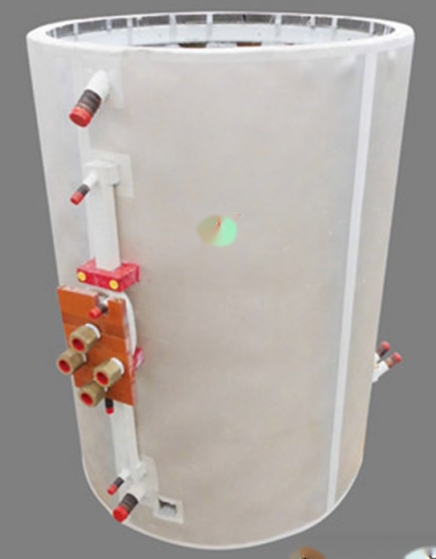- 10
- May
How to deal with the insulation of induction melting furnace coils?
How to deal with the insulation of प्रेरण पिळणे भट्टी coils?
1. For 380V incoming line voltage, the voltage at both ends of the coil is 750V, and the voltage between turns is also several tens of volts. If the distance between turns is large enough, the distance between turns can also be used as insulation. This is the early insulation treatment. If the steel slag splashes on the coil, a short circuit between turns will be formed, and this method has now been eliminated.
2. The commonly used insulation treatment process for induction melting furnace coils is four insulation treatment methods. First, spray insulating paint on the surface of the coil; secondly, wrap a layer of mica tape on the coil that has been sprayed with insulating paint; third, wrap a layer of glass ribbon on the outside of the mica tape; finally, spray a layer of insulating paint. Such an insulation treatment process can ensure that the insulation withstand voltage of the induction melting furnace coil is as high as 5000V.
3. Another method of insulation treatment for induction melting furnace coils is to directly spray high-temperature insulating paint. Some common insulating paints claim that the temperature can withstand 1800 ° C, but spraying high-temperature insulating paint is also a simple method. Theoretically speaking, the higher the insulation level of the high-temperature insulating paint, the higher the temperature resistance of the insulating paint. The high volume resistivity of the high-temperature insulating paint is greater than 1016Ωm at room temperature. High dielectric strength (breakdown strength), greater than 30KV/m. It has good chemical stability, aging resistance, corrosion resistance and good soothing reactivity. No flash point, no ignition point, high hardness, hardness greater than 7H. Heat resistance 1800℃, can work under open flame for a long time.
4. Whether the insulation of the induction melting furnace coil is the insulation of the inter-turn distance, or the winding of insulating materials or the spraying of high-temperature insulating paint, a layer of refractory glue must be applied inside the coil and between the turns of the coil.
Coil refractory mortar is used for the coil of the induction melting furnace. It is evenly spread on its surface and the ramp, which has a good insulating effect, and can prevent the short circuit or discharge between the coils from generating excessive inrush current to burn out the thyristor. The coil is aging and the coil is ignited due to water leakage, which can effectively prevent the furnace from passing through the furnace due to the high temperature of the molten steel.



